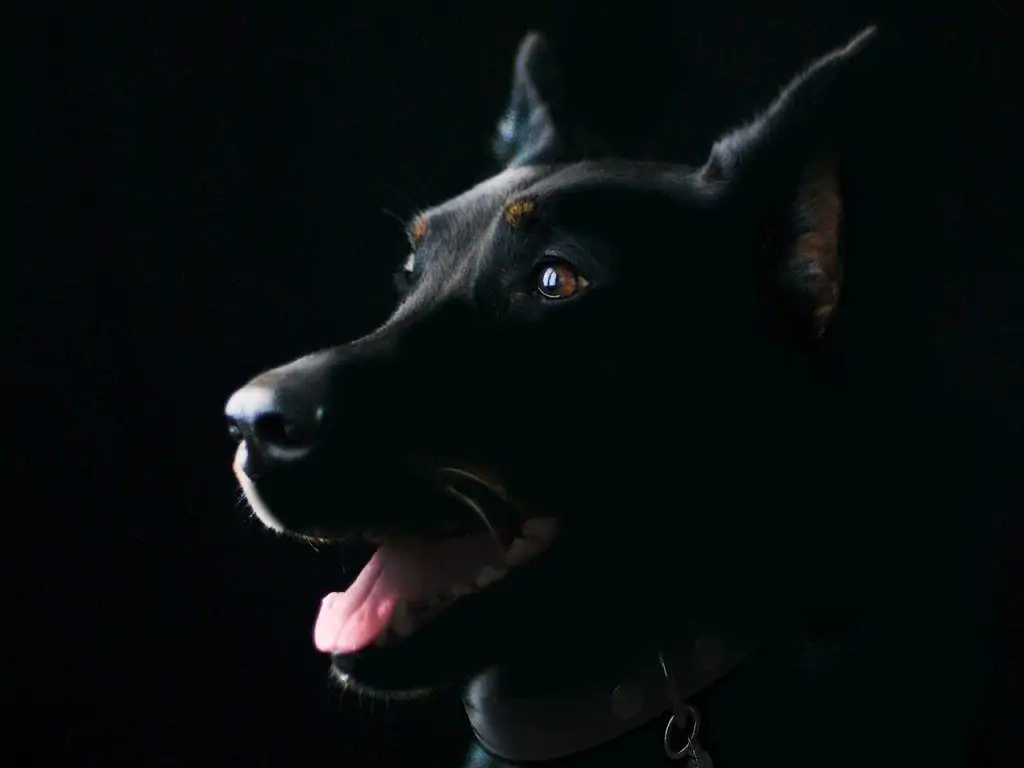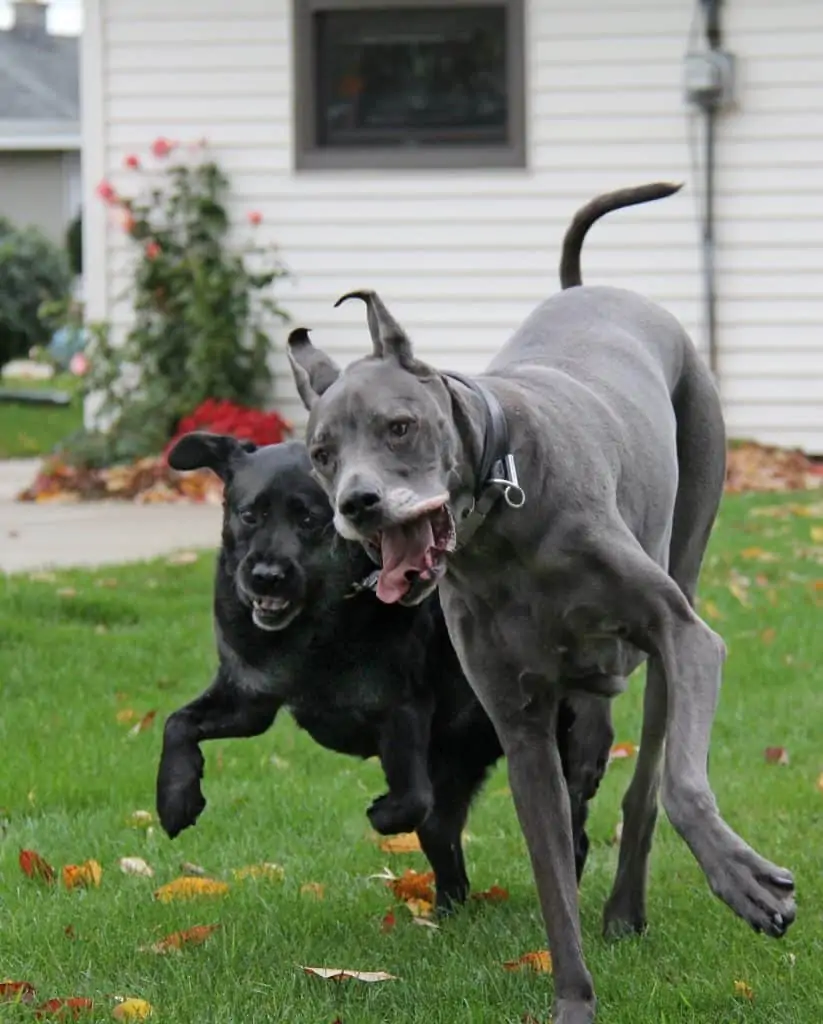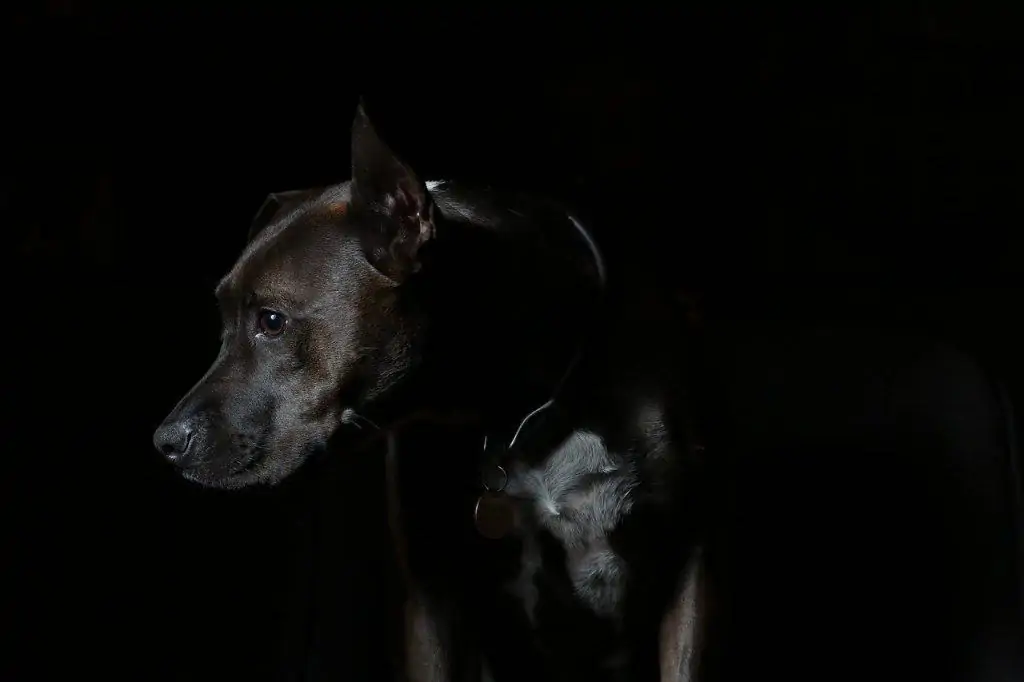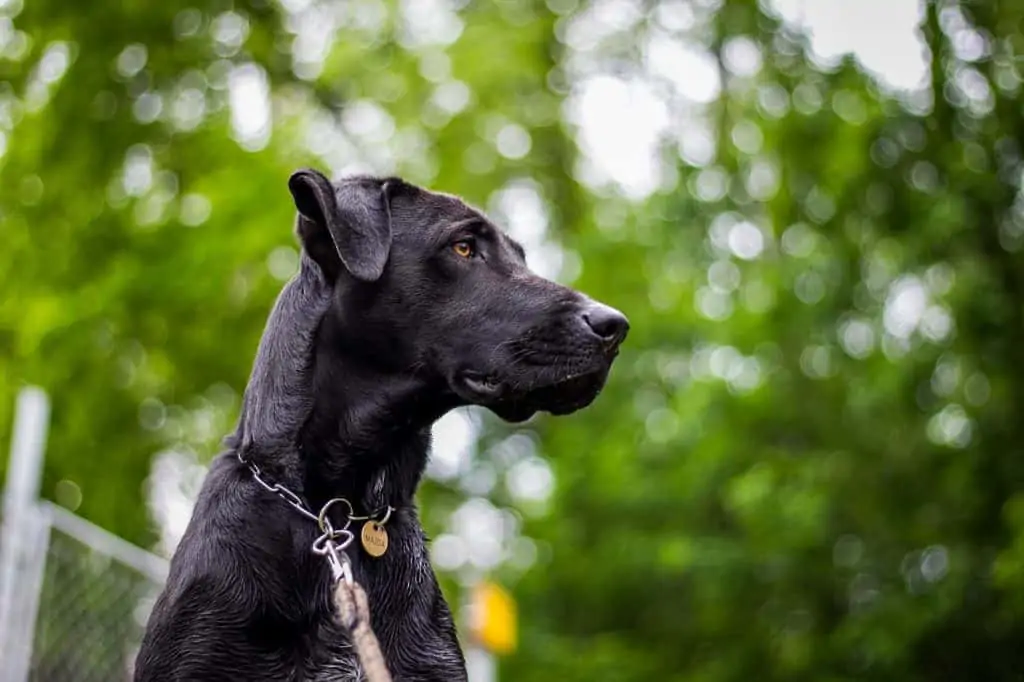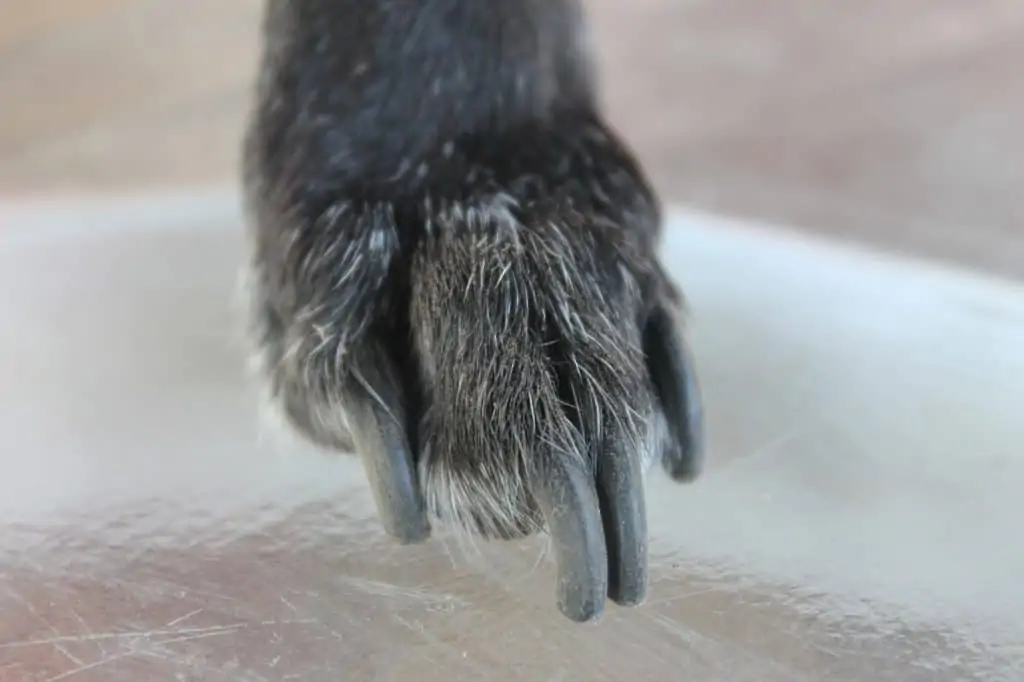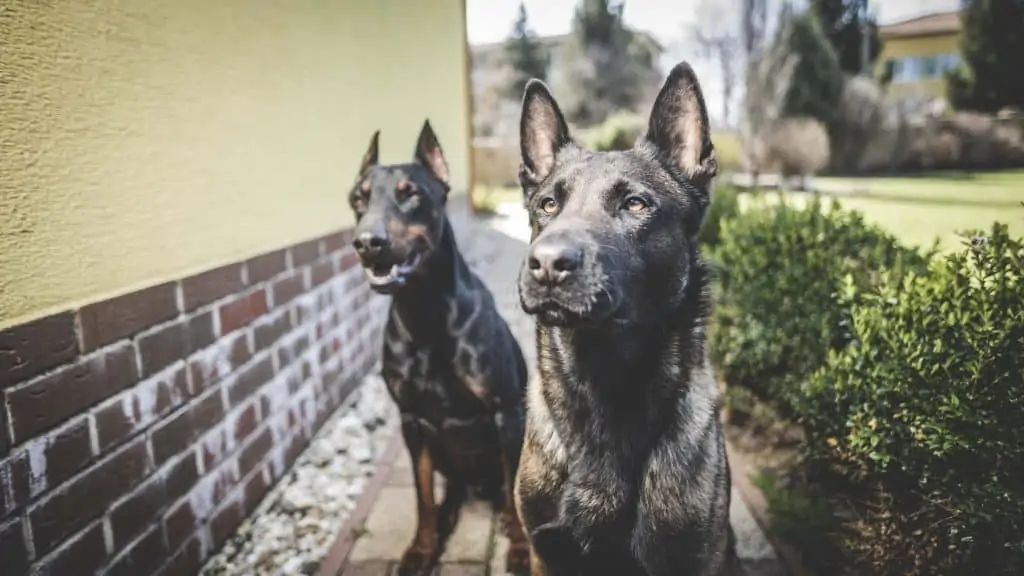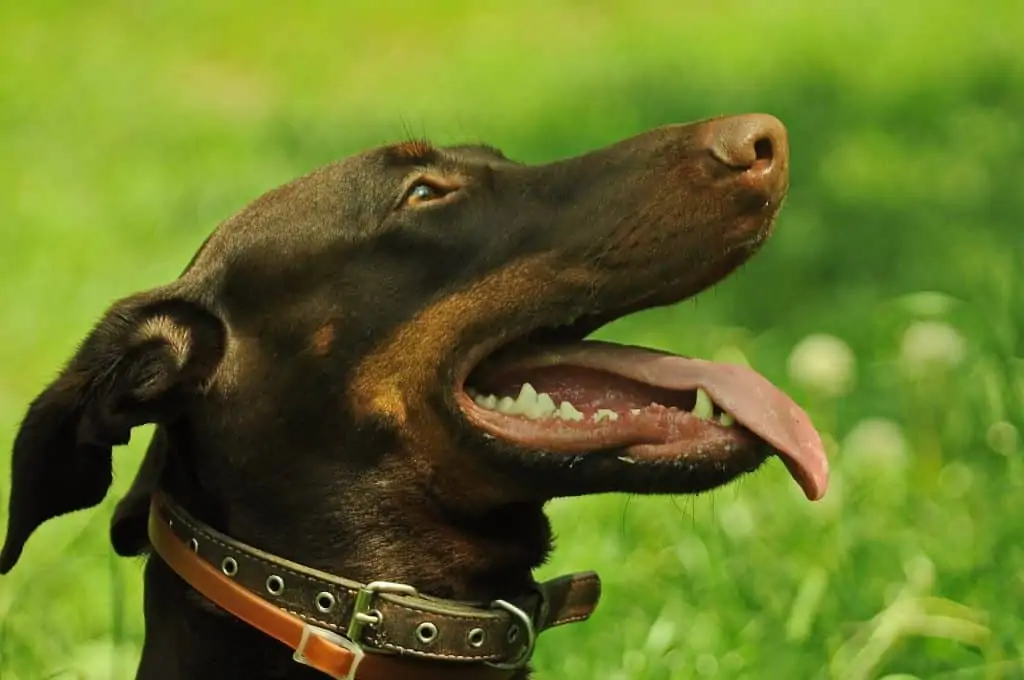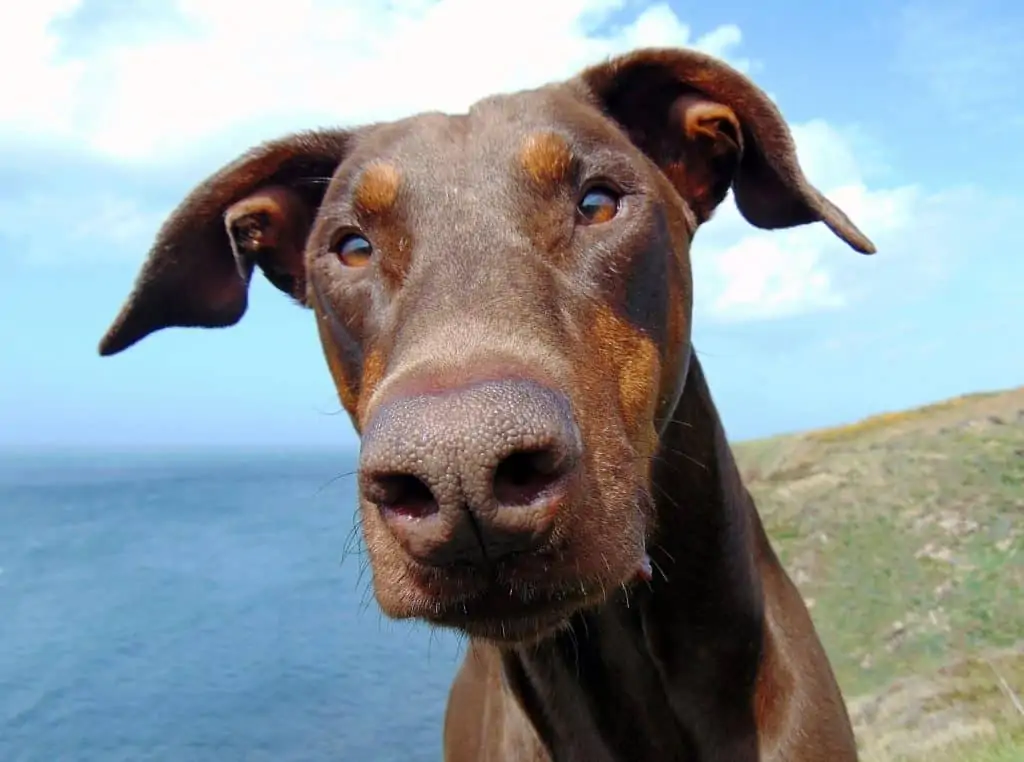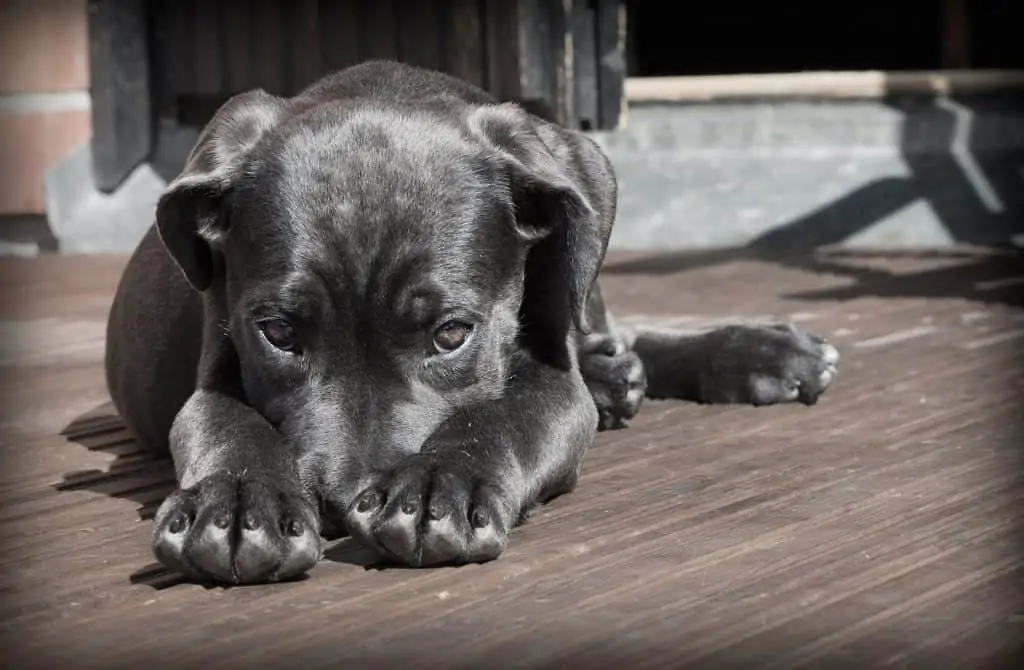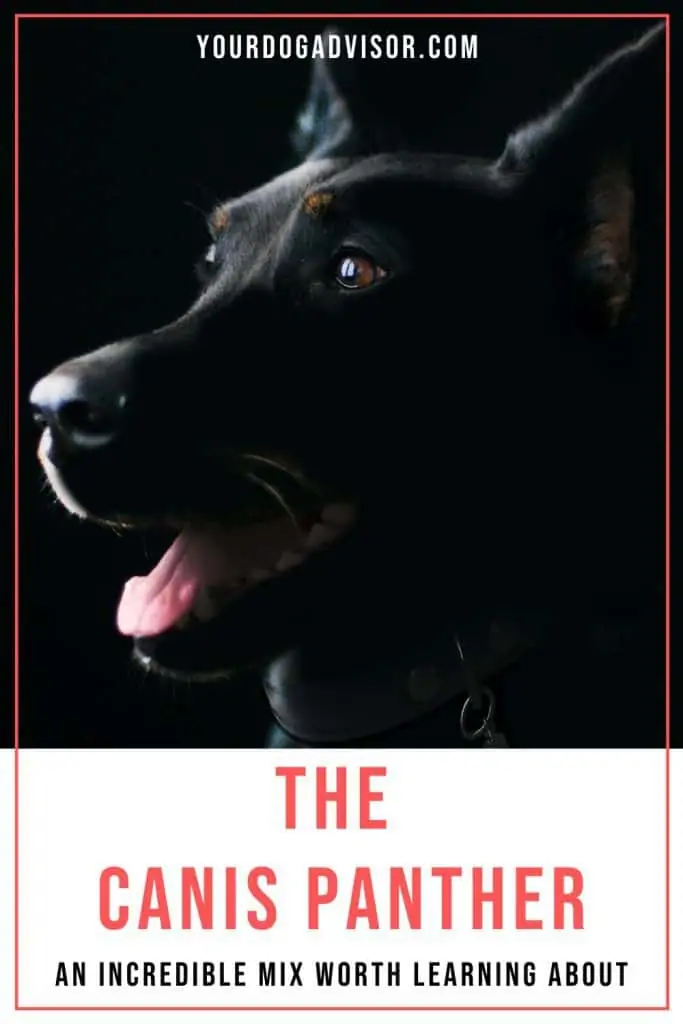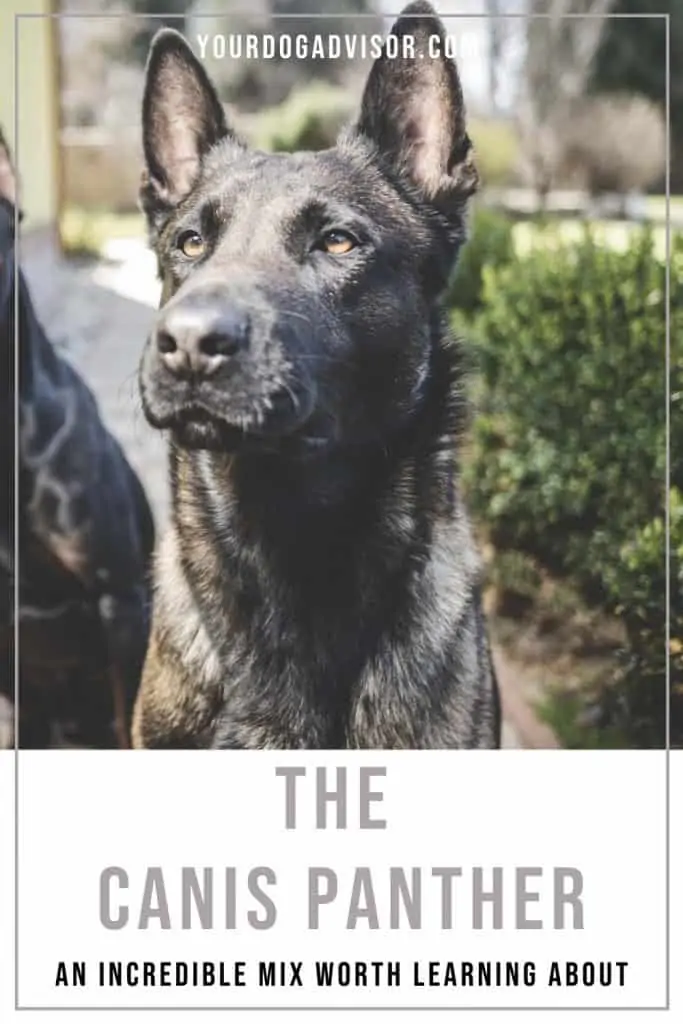Have you ever dreamed of owning an exotic tiger? Why not settle for a panther…a Canis Panther, that is.
Also known as the Panther Dog, the Canis Panther is just as exotic, hair raising and intriguing as the wild cat for which he is named. That said, it’s quite clear that this rare and intimidating mix is not the ideal dog for everyone.
In fact, owners should think long and hard before investing in one of these hard working and devoted breeds.
Curious to learn more? Then you’ve come to the right place. Today, we are talking all about the Canis Panther. Let’s get started.
Contents
What Is The Canis Panther?
The Canis Panther is a mix of four massive, imposing dogs.
At a glance, the Canis Panther is hard to miss. However, it’s likely you’ve never seen one before. These dogs are very rare and were only recently introduced into the canine kingdom.
The Canis Panther is a combination of four different breeds and is designed for guardian and protection. While he can be sweet tempered and loving, he is not the ideal family dog and can quickly become protective and even aggressive if he feels his family is in danger.
Massive and often jet black with docked ears, the Canis Panther epitomises his name. He is a well-built, muscular dog who is highly sensitive, intune with those he loves, and constantly on the lookout for danger.
But where did the Canis Panther come from and which type of owner would be best suited to raise this dog?
Keep reading to find out.
Understanding The Canis Panther History
The Canis Panther is a mix of four different dogs including the Great Dane and Black Lab.
With a name as visually appealing as “Canis Panther”, one may not be shocked to learn that the Panther Dog was designed by a famous dog trainer of the 70’s who went by an equally intriguing name – Scorpio Jones.
Along with a few other breeders and enthusiasts, Scorpio worked to create large, imposing dogs specifically bred for guarding and protection.
The Canis Panther is a combination of four famous dogs, including:
Considering the crossbreeding and perfecting of dogs has been going on since the beginning of the canine/human relationship, it’s no surprise that the newly introduced Canis Panther has yet to be recognized as a purebred by most major breed clubs.
That said, there are those who have taken it upon themselves to focus on breeding the dog, and it is possible to find what many would consider purebred Canis Panthers from devoted breeders.
To be clear, a purebred dog is a dog who has gone through generations of breeding and perfecting. This means that a purebred Canis Panther will be a dog that is the offspring of other Canis Panther dogs who are also the offspring of Canis Panther parents, and so on and so forth.
However, not many breeders breed and sell this dog as the demand for it is scarce. In fact, many people have never even heard of the Canis Panther before.
With that in mind, it can be difficult to come across a purebred Canis Panther, and you are more likely to come across dogs with certain mixes and even other breeds combined in their DNA that are called Canis Panthers when they really aren’t.
We should also note that the Canis Panther, though new, is a bred working dog. His instincts are highly intune and he is focused on protection and guarding. For this reason, he is not the ideal family dog and playmate for young children or active families.
But we’ll talk more about that further down.
For now, let’s talk about what you can expect when it comes to the Canis Panther appearance.
The Canis Panther Average Appearance
The Canis Panther is large and often has cropped ears and a docked tail.
Canis Panther Height: 27 – 28 Inches
Canis Panther Weight: 115 – 150 Pounds
Canis Panther Coat Color: Black, blue/grey, brown and fawn.
Canis Panther Coat Type: Short, smooth, shedding
Hypoallergenic Coat: No
Overview of The Canis Panther:
With a sleek coat, small eyes, and muscular body, the Canis Panther is a sight to behold. While he can come in a few other color variations listed above, most “purebred” Canis Panthers tend to be black. Their eyes are dark and their ears are often docked, though this is not always the case.
The Canis Panther is massive, which is to be expected considering he is a mix of Great Dane and Doberman. The Pitbull and Lab lend to his athletic, muscular build and coat texture.
They are certainly a sight to behold. And if their look is intimidating, wait until you learn about their temperament.
What Are The Canis Panther Dog’s Temperamental Traits?
Intimidating in appearance, the Canis Panther is a sensitive, loyal and affectionate dog with family members. However, he is highly suspicious of strangers.
The Canis Panther is a highly intelligent dog who is very intune with his family’s emotions. He is able to pick up on subtle facial expressions and body language and is thus quite sensitive, especially if he is in chaotic situations.
While he is loyal, loving and devoted to those he is raised with, he does not do well with strangers and other pets. This includes children and other dogs, especially dogs of the same gender.
Bred for protection, the Canis Panther is known to put his life on the line for those he loves, and while this is an admirable trait, it can be dangerous if he is raised by the wrong owner.
Canis Panther dogs require an owner who is strong, consistent and devoted to the breed and who understands the potentially dangerous traits the breed entails. This dog is also not especially playful, though he is very affectionate and sweet.
With his family members and children he is raised with, he is a snuggly dog who can be goofy at times. He will want to be with his humans as often as possible and is a devoted and eager to please companion.
Because of this, training is a cinch, but even a well-trained Canis Panther may not be able to ignore his guarding instincts. If he feels his family is in danger, he will likely act.
Is The Canis Panther A Good Family Dog?
The Canais Panther, when properly trained and socialized, makes gentle family companions.
As you may have gathered from the above information, the quick answer would be no, the Canis Panther is not the ideal family dog. While he can do well with children he is raised with, he’s not the best dog to have in homes where children will be playing, running, wrestling, or having friends over.
The Canis Panther will not tolerate rough play from what he may see as his brood. He is also known to be territorial around other dogs, sometimes even if he is raised with them.
This is a breed who is not the ideal dog for those who are social and enjoy having company over, as he is especially weary of strangers. Even if well socialized, a Canis Panther is designed for protection, and he takes this job very seriously.
For this reason, he is best suited for experienced dog owners who understand working breeds and guarding breeds and who are able to be committed to consistent training and solution throughout their Canis Panther’s life.
If you do have a Canis Panther and children in the same home, it’s wise to monitor them. We also suggest working with children on how to appropriately behave around dogs, especially dogs with guarding instincts.
Tips On Grooming A Canis Panther
The Canis Panther can suffer from painful broken nails if they are not routinely clipped.
Although the Canis Panther is not the most low maintenance dog when it comes to temperament, he is incredibly easy when it comes to grooming. His short, sleek coat only sheds minimally and requires occasional brushing with a slicker comb from time to time.
His coat is also weather and water resistant, so bathing will only need to be done once every few months unless he gets particularly dirty.
However, the Canis Panther can grow longer nails, as seen in the image above. This is an active and athletic dog who can be prone to breaking his nails during exercise or play, which can lead to painful infections. Be sure to trim your Canis Panther’s nails routinely to keep this from happening.
Like all dogs, the Canis Panther should also have his ears checked and cleared regularly to keep them free of debris, waxy buildup and moisture that can lead to ear infections. Last, his teeth should be cared for using a dog-safe toothbrush and toothpaste.
We have listed some of our favorite products for dental care for large breed dogs below. Take a look.
Virbac Enzymatic Dog Toothpaste
[amazon box=”B00RZDXA7K” style=”light” title=”Virbac Dog Toothpaste” template=”widget” ]
One of our favorite dog-safe toothpastes is a toothpaste by the company Virbac. This toothpaste is chicken flavored and includes ingredients that are designed not only to help reduce bad breath but also to remove tartar and plaque buildup.
Unfortunately, dental disease is one of the most common issues our canine counterparts face, but routinely brushing with a quality toothpaste like the one above can help reduce health problems associated with gum and tooth decay.
H&H Pets Dog Toothbrush
[amazon box=”B071Y2GDB1″ style=”light” title=”H&H Pets Toothbrush” template=”widget” ]
Having the right toothbrush on hand for your Canis Panther can also make a big difference. The above tooth brush is elongated and has two sides with different types of bristles. This helps ensure you get the best clean out of your dog’s mouth.
The kit comes with a pack of four toothbrushes and is safe and gentle on your dog’s teeth and gums. When used routinely, brushing with these brushes can remove tartar, plaque and food debris, thus reducing potential health risks of dental disease.
What You Should Know About The Canis Panther’s Lifespan and Health Problems
The Canis Panther, seen on the right in this image, can suffer from the same health issues as relatives, including the Doberman, the Lab and the Great Dane.
When obtained from a reputable source and raised properly, the Canis Panther can have a decent lifespan of around 10 to 11 years.
The Canis Panther is also a hybrid dog, and there is some speculation regarding hybrid vigor and the potential for mixed breeds to be healthier than purebreds. While there is something to this argument, as mixed breeds do have a wider genepool than their purebred counterparts, it’s still possible for a Canis Panther to suffer from any of the same genetic health issues as the dogs he is a mix of.
Furthermore, the Canis Panther is also a very large breed, and is thus susceptible to many of the same health concerns as other large breed dogs.
Some of the health issues owners should be aware of include:
- Gastric Dilatation Volvulus (AKA Bloat)
- Hip Dysplasia
- Elbow Dysplasia
- Dilated Cardiomyopathy
- And Ear infections
What You Should Know About Bloat
Bloat, also known as Gastric Dilatation Volvulus or GVD, is a serious and often life threatening condition that can come on suddenly. Large, deep chested dogs like the Canis Panther are most susceptible to suffering from Bloat, so it’s important for owners to be aware of the causes and symptoms and have a plan of action should their dog come down with GVD.
GVD occurs when gas or air fills the intestines and causes organs like the stomach and kidneys to flip. When this happens, blood flow is cut off from the dog’s lower body, which results in shock and sometimes death.
Although Bloat can come on suddenly, it is often caused when a dog eats or drinks too quickly, eats or drinks after exercise, or eats something he shouldn’t.
Symptoms of Bloat include panting, excessive drooling, pacing, unproductive vomiting, obvious pain, extended abdomen, and collapse.
If you notice symptoms of Bloat in your dog, it’s important to get him to a veterinarian immediately for emergency care.
You can also work to avoid problems like Bloat by investing in slow feeders, ensuring your dog eats a quality dog food, and making sure your Canis Panther does not eat or drink immediately after exercise or play.
Tips On Feeding Your Canis Panther
Canis Panther dogs require a high protein diet that is rich in real animal meat.
Because the Canis Panther can be susceptible to Gastric Dilatation Volvulus, (Bloat), it’s important that he eats a high quality dog food specified for his age, weight and activity level.
Canis Panther dogs should eat dog food for large breed dogs that is designed to promote bone and joint health, muscle tone and skin and coat health. Steer clear of dog foods that contain additives like corn, soy, wheat or byproducts and instead pick foods that contain real animal protein, carbs, vitamins, minerals and fatty acids.
You have the option of choosing between wet food, raw food and dry dog food. We have also listed some of our favorite types of dog foods for the Canis Panther for you to consider as well.
Acana High Protein Dog Food
[amazon box=”B01DJK8N8S” style=”light” title=”Acana High Protein Dog Food” template=”widget” ]
The Canis Panther is considered a large breed dog. He is also athletic, active and muscular. For this reason, he will require a dog food that is high protein and that contains the proper fatty acids and nutrients to help support muscle and joint health.
One of our favorite dog foods for large, active dog breeds is Acana High Protein Dog Food. This is a freeze dried dog food that is available in several different protein options including wild salmon, chicken or lamb.
It is suitable for all life stages of your Canis Panther, though we recommend it ideally for adult Canis Panther dogs between the ages of one and seven.
Blue Buffalo Wilderness High Protein Dry Dog Food
[amazon box=”B00YFZ7BDA” style=”light” title=”Blue Buffalo High Protein Dog Food” template=”widget” ]
Another dog food you might consider for your Canis Panther is by Blue Buffalo. This high protein dog food is also designed for large, athletic dogs, although it is a dry kibble and is therefore easier to store.
Dry kibble does have it’s pros and cons, but one thing we like about the above dog food is that it is made with all natural ingredients and is free of any additives or fillers. Best of all, eating dry kibble can help increase dental health by reducing plaque and tartar buildup.
You might consider mixing your Canis Panther’s dog food with a combination of dry food and raw food in order to ensure he gets the proper nutrition he needs to grow and thrive.
Canis Panther Exercise and Training Requirements
Highly intelligent, Canis Panther dogs require routine exercise and mental stimulation.
All dogs require routine exercise and training, and this is especially true when it comes to the Canis Panther. In this section, we are covering four important tips owners should follow in order to raise a happy, healthy and well rounded Canis Panther.
Exercise
Though they are large and muscular, the Canis Panther does not require as much routine exercise as you may think. He will do well with a good walk each and every day that is at least 30 to 40 minutes long, as well as some free playtime in a securely fenced yard.
This will come in handy when out and about on walks, considering the Canis Panther has the ability to be so much stronger than his owner. With that in mind, it’s also important that you invest in the right walking equipment to ensure walking is safe and comfortable.
Halti Head Harness
[amazon box=”B081QZ1C98″ style=”light” title=”Halti Head Harness” template=”widget” ]
Exercise is vital to your Canis Panther’s overall happiness and health, but it’s also important to take precautions when walking this massive breed. Because they are so large and muscular, it would be easy for them to pull and make walking difficult.
In order to feel confident on your walk with your Canis Panther and keep the best control possible, we recommend using a Halti Head Harness. This is an excellent and much more dog-friendly alternative to using choke chains and prong collars, and it has even been proven more effective by trainers.
The harness goes over the muzzle and fits securely and snugly behind the ears. It is padded and comfortable for your dog, though it may take him a moment to get used to it. This harness uses pain free redirecting to teach your dog walking manners and is ideal for owners who are walking larger, stronger dogs with guardian instincts.
Mental Stimulation
Canis Panthers are also highly intelligent, so they will need lots of mental stimulation throughout the day. Puzzle toys can help keep them engaged for a while, but most Canis Panthers will be happiest learning and following commands from their owner.
Training
The Canis Panther is a devoted dog who enjoys learning. He is eager to please his family and will be a joy to train. With that noted, training should begin from the moment you get your Canis Panther and should continue throughout his lifetime.
Canis Panther dogs respond best to a consistent, confident trainer who is firm yet patient during training. Try and refrain from negative reinforcement techniques and instead use praise and treats to keep your Canis Panther engaged. This will help strengthen the bond between the two of you and build trust, which is incredibly important for this breed.
Socialization
Last, we have socialization. This is perhaps one of the most important steps you should not neglect when it comes to raising a Canis Panther. Because this dog has guardian instinct and is bred for protection, he has the potential to be aggressive and even dangerous in the wrong hands.
However, when properly socialized at an early age and consistently trained, this breed is likely to be a loving and loyal companion.
Socialization should include introducing him to as many new people, places, things and experiences as possible in his puppyhood. During their puppy stage, Canis Panthers are much less reserved and more likely to enjoy being around different people, animals and children.
Exposing him to positive first experiences often during this time will help him grow up less weary of strangers and can reduce fear-based aggression and other undesirable behaviors in the breed.
What Is The Ideal Home Type For A Canis Panther?
Canis Panthers are a combination of loyal and loving breeds. As such, he will do best with a devoted and attentive owner.
Is the Canis Panther right for you?
If you’re on the fence, we suggest you write down a list of pros and cons surrounding the breed and ask yourself some important questions. Remember, this is a dog who is highly intelligent and devoted, but he also can exhibit some serious behavioral issues if he is not properly trained and socialized.
He is not the best dog for novice dog owners or families with children and is instead more suited for experienced dog owners who understand the responsibility that comes with owning a guarding breed.
The Canis Panther will also do best in homes with a large, securly fenced yard. He is not suited for apartment living and should be in a home where owners are around often to devote time to training and socialization.
Where To Find A Canis Panther Puppy or Rescue Dog
Canis Panther Puppies should be obtained through a reputable source in order to avoid potential health or behavioral issues down the road.
Finding a purebred Canis Panther may prove to be difficult considering this dog is rare and still relatively new to the scene. For this reason, you’ll likely be unable to locate this breed at a shelter or rescue.
If you want to get your hands on a Canis Panther, your best bet is to do plenty of research and go through a republate breeder who specializes in the breed.
On average, a Canis Panther costs around $1,000. It’s incredibly important not to try and cut costs by getting a Canis Panther from a backyard breeder or unqualified online seller, as you could easily wind up with a sick puppy or a dog with serious behavioral issues down the road.
With that in mind, make sure the breeder you go through is certified. Most reputable breeders should be able to provide you with health certificates proving their dogs have been screened and cleared of any issues.
You may also be able to meet your puppy’s parents to get a better idea of what your Canis Panther will grow up to look and behave like.
With that said, before you do decide to invest in a Canis Panther, make sure you have the time and energy to provide to one. While these dogs do have the potential to make amazing companions to the right owners, they are not an every day family dog and require serious commitment.
So, what do you think about the Canis Panther? Do you think you have what it takes to raise this powerful and imposing dog?
Leave us your thoughts in the comment section below.
Best of luck and thanks for reading!

Jen Jones is a professional dog trainer and behavior specialist with more than 25 years of experience. As the founder of ‘Your Dog Advisor’ and the ‘Canine Connection’ rehabilitation center, she applies a holistic, empathetic approach, aiming to address root causes rather than merely treating symptoms.
Well known for her intuitive and compassionate approach, Jen adopts scientifically-proven, reward-based methods, encouraging positive reinforcement over punishment. Jen specializes in obedience training, behavior modification, and puppy socialization. Her innovative methods, particularly in addressing anxiety and aggression issues, have been widely recognized. Jen has worked with many of the world’s leading dog behaviorists and in her free time volunteers with local animal shelters and rescue groups.
